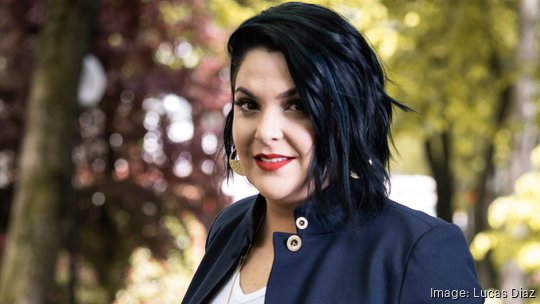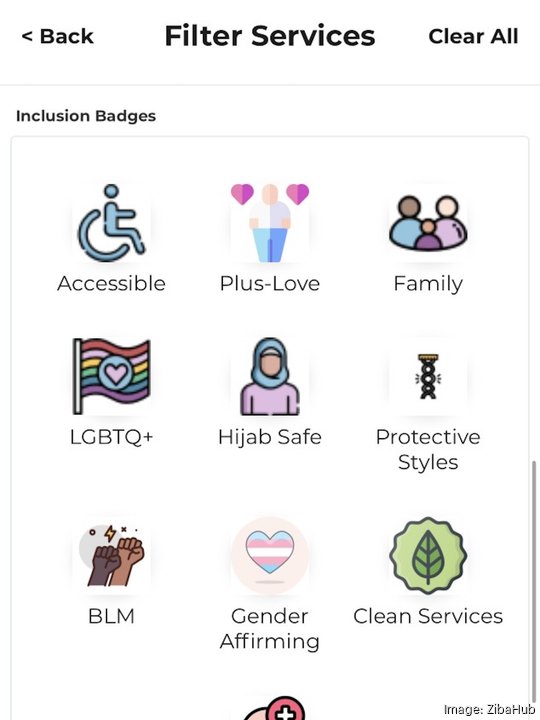
Portland-based ZibaHub started in 2018 as a way to help stylists and beauty professionals find jobs and create an industry networking site. Its first apps launched in 2019.
By early 2020, co-founder and CEO Mandana Salehi-Stewart was pulling together its first fundraising round. That was quickly derailed as the Covid-19 pandemic took hold and Salehi-Stewart, like most business owners, was thrust into a new reality.
We caught up with her to talk about how she got through the year and where ZibaHub is headed.
To start off with, for folks who aren't familiar with ZibaHub, tell us a little bit about the startup? ZibaHub is a mobile app that connects salon professionals with employers and customers with a particular emphasis on intersectionality and diversity. The management team is up to about eight right now. And we have 10 ambassadors. We have about 1,500 local users, mostly here in Portland, and some as far as Seattle.
Take us back to the beginning of 2020, you were raising money when everything shifted. What happened? It was a really successful first week. We raised half of our round, the first 48 hours. And we were also in due diligence with a few different people. We were hopeful that we would get the rest of the round together quickly. That was right around this time last year. So as soon as (the pandemic) happened the whole city shut down. That kind of fell apart, in terms of our round. We took the emphasis off of raising money and put it on building the product and building our community.
As the gravity of the pandemic kicked in, what were your first thoughts? And what did you do? The first thing that I thought of is, as we were creating the app, we always used to say that beauty is a recession proof industry. And it turns out, it's not a pandemic proof industry. So it was a bit of a curveball. But as time went on, we realized that the industry was going to bounce back. There were memes and jokes about how everybody missed their hairstylist and how everybody looked like they hadn't been to the salon in a while. So we knew the industry was coming back. But we had to refocus and see what we needed to do to stabilize the users that we currently have. And we had to start listening more to them in terms of how the pandemic has changed the industry.
What major changes did you make, either to the product or how you were building things out? The focus in the app previously was just helping to staff salons. We were looking at ZibaHub as a dynamic job board in a way where stylists could find jobs or commission stations to lease. After the pandemic it became evident that a lot of customers were afraid to go back to the salons, even after everything opened up. At the same time, there was the whole social reckoning happening, and people were demanding to know more about who it is that they're working with, and where they're spending their money. We talked to the stylists and the salons about what they needed, and they said they needed customers. So we took the existing infrastructure, we added a customer portal. Now customers can also discover stylists and salons and it helps to increase traffic. We already had a lot of initiatives in place for diversity and inclusion, such as our inclusion badges that help people locate stylists with your particular skills or social values such as LGBTQ friendly or gender affirming or hijab safe or protective styles. So we incorporated all of that into one big portal and created a safe space where customers can discover salon services and salons can still find talent.

And are you seeing the customers come back now that things have been opened up for a little bit longer? We did a survey (in late March) to ask if the salon still felt like the pandemic was affecting their business compared to pre pandemic. And 96% of the people who responded to the survey said that they were still feeling the impact financially.
What is the plan for the company for you the rest of this year? The plan now is to onboard more customers. The emphasis before was getting more stylists and salons. Beyond this, we want to go outside of Portland. We're ready to grow.
Looking back on the last year what did you learn about yourself as a leader? Funny enough, as a mom and a woman (in) startups, I get questioned a lot about, how do you balance parenting with also being a founder. And I think there's definitely a correlation there. I remember the first time my son fell and got a big laceration on his forehead. Everybody who was at our house at the time started panicking. I was the only one who was calm and got everybody dressed and drove to the hospital. I remember the staff of the hospital saying, "Wow, you're so calm right now." I was like, well, somebody had to be calm and get it under control. I think, honestly, that was reflective of this time last year when everything was spinning, and everyone was in a panic. I kind of had to step back and be like, Okay, this is the reality we're dealt, what are we going to do? There's definitely something to that.



